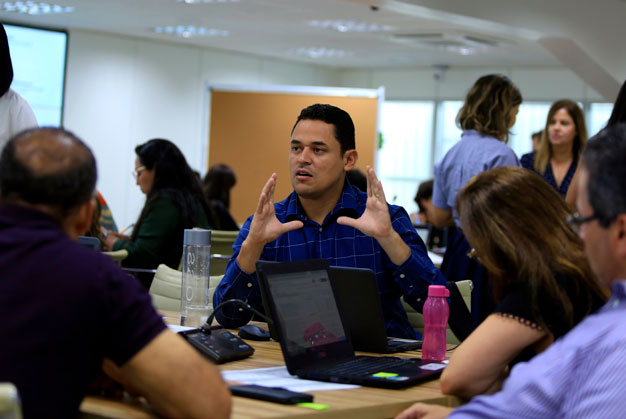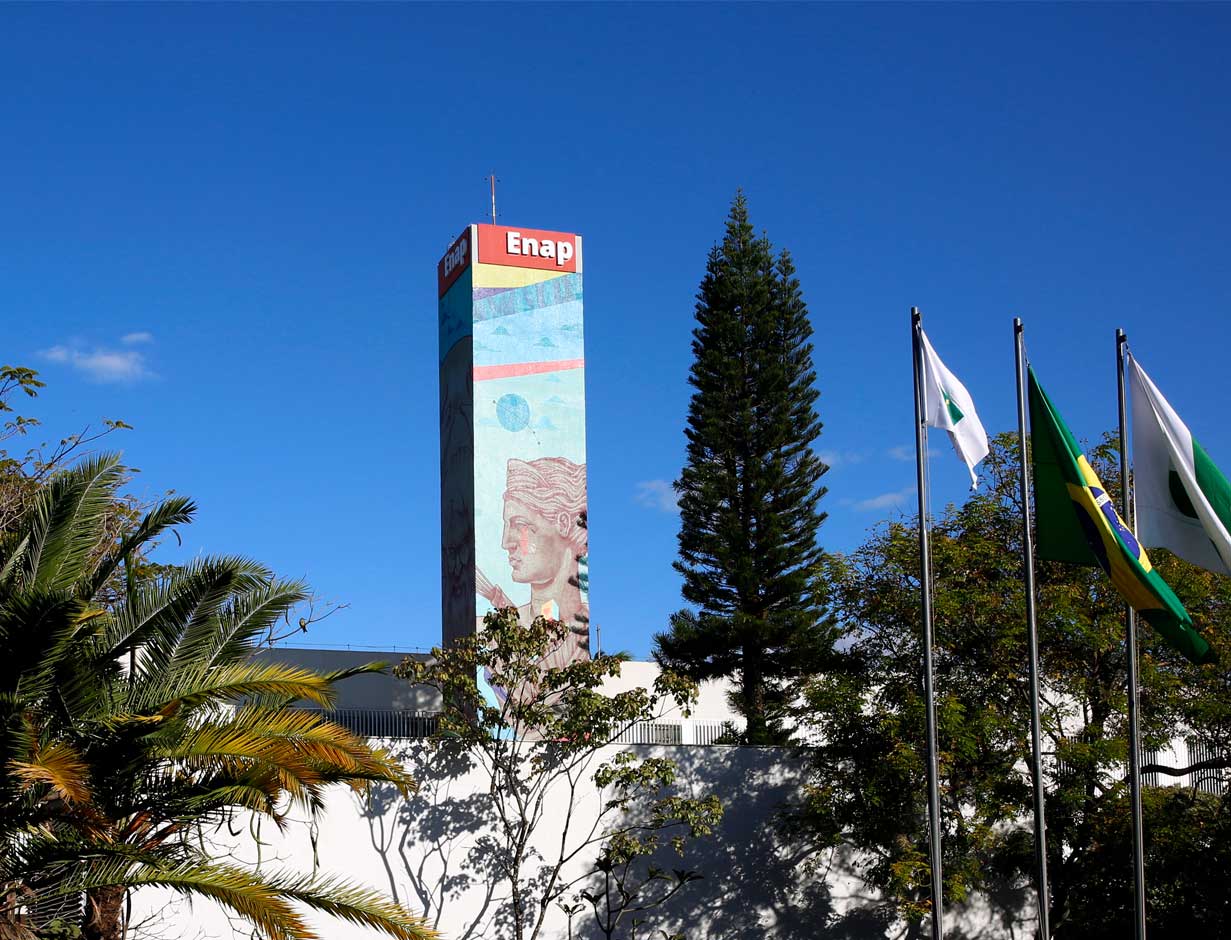Master of Public Policy (MPP)
The Enap’s Master of Public Policy (MPP) is a graduate certificate program for high-level civil servants of Brazil and other partner countries focused on developing leadership competences and strengthening hard and soft skills.

About
Integrating theory and practice, the MPP is a one-year degree Program. Faculty-led online courses are offered in English for Brazilian and international audiences.
Study with internationally distinguished faculty teaching the MPP twelve courses that comprehend one elective course offered in partnership with the Columbia Global Centers – Rio de Janeiro, including faculty from Columbia University’s School of International and Public Affairs (SIPA).
Online course with live classes
Classes on Monday, Tuesday and Thursday from 6.30pm to 10pm (BRT)
Period and workload
Jan/2022 to Dec/2022 360 hours of classes
Audience
- civil servants of Brazil - civil servants of other partner countries;
Tuition
Tuition is covered by the Brazilian Government.
Why attend MPP?
Internationally renowned experts in current issues of public management
Theory and practice combined with an innovative approach and a curriculum aimed at developing hard and soft skills.
4 certified courses by Enap and Columbia Global Centers
Opportunity for interaction among students from different countries
Graduates
The MPP will prepare you to:

Problem-solving
Meet challenges of the public sector by connecting theory to their own experiences on policy development, implementation, and evaluation.
Analyze the current state of affairs in a specific policy domain and act upon it. The MPP aims to form problem-solvers so that its graduates qualify to advance their careers, assuming leadership positions.

Make better decisions
Apply research and data to public policies and perform data-driven evaluations of program and policy outcomes and effectiveness.

Think strategically
Anticipate consequences of decisions and potential pitfalls when promoting change in the public sector. Build partnerships and alliances with different stakeholders for each policy.

Leading teams
Assess individuals and teams and promote a culture of excellence at work; build motivation and trust; improve communication skills.

Use international best practices when addressing policy problems
Promote innovation based on updated knowledge; promote solutions for complex social problems.
Curriculum
Total of 360 hours, divided in 13 core courses (30 hours) and one (15 hours) elective course.
4 of the 12 core courses and the elective course will be given in partnership with the Columbia Global Centers (CGC) – Rio de Janeiro, including faculty from Columbia University’s School of International and Public Affairs (SIPA).
![]()
![]()

To address the main theories and models of public policy development and understand their importance for a democratic system. Students must be able to identify the agents, conditions, available structures and other elements that guide the formulation of public policies. The course will also seek to develop the ability to understand the fundamentals of the process of formulating public policies and to discuss the current difficulties and dilemmas faced by the legislator in preparing them. It is expected that students learn to use, throughout the course, tools for analyzing the cycle of public policies, evaluating their types, stages and instruments.
List of topics:
- Dimensions of the public policy formulation process and the influence of the social, political and economic context
- Theories and models of public policy formulation;
- Stages and instruments for the implementation of public policies;
- Difficulties and dilemmas in the formulation and application of public policies;
- The different actors that participate in the elaboration of public policies;
- The political nature of the public policy formulation process;
- Analysis of national experience compared to other countries;
Suggested bibliography:
- Larry Gerston, Public Policy Making: Process and Principles 3rd Edition, Routledge.
- Thomas Birkland, An Introduction to the Policy Process: Theories, Concepts, and Models of Public Policy Making 5th Edition, Routledge.
- Karen Johnston Miller and Duncan McTavish, Making and Managing Public Policy, Taylor and Francis Group.
To study decisions of individuals and firms and their interactions in the market focusing on the behavior of consumers and producers within an industry. The discipline's specific objectives are to introduce the discussion on the formation of prices and quantities of goods and services, as well as on the effects of regulation, taxation and trade opening.
List of topics:
- Questions and Methods in Economics.
- How Markets Work.
- Markets and Welfare.
- The Public Sector Economy.
- Company Behavior and Industry Organization.
This course introduces computer-based models for decision-making. The goal is to help students become intelligent consumers of these methods. To this end, the course will cover the basic elements of modeling -- how to formulate a model and how to use and interpret the information a model produces. The course will attempt to instill a critical viewpoint towards decision models, recognizing that they are powerful but limited tools.
Topics include:
- Introduction to Decision Models, Optimization using Excel;
- Modeling Examples: Staffing, Transportation/Supply Chain, Production;
- Sensitivity Analysis;
- Multi-period Models;
- Integer Models.
To develop the ability to causally and empirically analyze public policies, from the approach of the main themes related to decision-making based on probabilistic, statistical and descriptive information in the context of public policies. The ability to analyze data will also be developed, as well as the use of other quantitative assessment tools, and analysis models and instruments for evaluating efficiency and quality.
List of topics:
- Introduction to decision theories, probability and statistics;
- Tools to assess real-world problems and identify the best solutions;
- Interpretation and evaluation of data for the formulation of public policies;
- Causal inference;
- Randomized controlled trials;
- Application of collected data in order to optimize decision-making in the formulation of public policies;
- Advanced empirical methods as practice: estimation, assumptions and analysis of results.
Suggested bibliography:
- Evan Berman and XiaoHu Wang, Essential Statistics for Public Managers and Policy Analysts, 4th Edition, Sage.
- Hank Jenkins-Smith, Joseph Ripberger, Gary Copeland, Matthew Nowlin, Tyler Hughes, Aaron Fister, Wesley Wehde, and Josie Davis, Quantitative Research Methods for Political Science, Public Policy and Public Administration: 4th Edition With Applications in R, (Book is opensource).
- Earl Babbie, The Practice of Social Research, 14th Edition, Cengage.
Examine the main economic, social and legal theories and models in the formulation of public policies. Develop skills in analyzing and using economic data for decision making. Understand the role of law in the formulation of public policies.
List of topics:
- Incentive theory.
- Regulation theories.
- Positive and normative analysis.
- Ethical dimension in the formulation of public policies.
Suggested bibliography:
- Richard Posner, Economic Analysis of Law, 9th ed., Aspen Publisher, 2014.
- Robert Cooter and Thomas Ulen, Law & Economics, 6th ed., Ed. Pearson, 2016.
- Michael J. Trebilcock and Mariana Mota Prado’s Advanced Introduction to Law and Development, Edward Elgar, 2014.
- Eldar Shafir (editor), The Behavioral Foundations of Public Policy, Princeton University Press, 2012
To explore the most important topics faced by managers in their choices and decision-making, to develop strategic capacity and prepare action plans. The aim is to improve the ability to formulate arguments about how public administration issues should be resolved. At the end of the course, the student should be able to recognize and define public management issues at different levels of government, offer analysis of problems, find solutions and be able to make good arguments.
List of topics:
- Dimensions of public administration: administrative structures, cultural organization and individual skills of administrators.
- Motivation in the public sector.
- Rule of Law, the backbone of public management.
- Administrative burdens and bureaucratic issues.
- Organizational performance and learning.
To study the modern demands of administration in face of the complexities of society, in order to understand the interaction of different agents in the public and private sectors. Students will learn to manage the tools for the development of innovations and transformations in government, and will be trained to analyze, through illustrative cases, examples of the implementation of innovative ideas in the public sector. The objective is to allow students to approach innovations and transformations in public administration using the theoretical tools developed throughout the subject.
List of topics:
- Performance of the public administration facing the demands of the 21st century;
- Tools for innovation in public administration;
- Partnerships between private entities and the public sector;
- Digital and technological innovations;
- Processes that maximize social return;
- Development and application of concepts and instruments in practical situations.
Suggested bibliography:
- Christian Bason, Leading Public Sector Innovation: Co-Creating for a Better Society, Policy Press, 2014
- Clayton M. Christensen, The Innovator's Dilemma: When New Technologies Cause Great Firms to Fail, Harvard Business Review Press, 2016.
- Henry Chesbrough, Open Innovation: The New Imperative for Creating and Profiting from Technology, Harvard Business School Press, 2003.
- Matt Ridley, How Innovation Works: And Why It Flourishes in Freedom, HarperCollins Publishers, 2020.
- Sandford Borins, The Persistence of Innovation in Government: A Guide for Innovative Public Servants, IBM Center for the Business Government, 2014
- United Nations Economic Commission for Europe Innovation in the Public Sector, ECE/CECI/23, 2017
The colloquium facilitates the discussion of contemporary issues involving economic, historical, social and political aspects in the formulation and development of public policies in Brazil, as well as in other middle-income countries. The responsible teacher will invite authors to present their work and debate with students. The choice of guests will be partially guided by the thematic preference of the students, who will be able to choose the topics they most want to address.
Possible themes include:
- Infrastructure development.
- International trade and finance.
- Monetary and fiscal reforms.
- Urban and rural development.
- Social Security Reform.
- Vocational education and training.
- Health and wellness.
To develop leadership skills through theoretical and practical studies so that students understand the role of the leader in public sector organizations. Leadership techniques in the public sector and their specificities will be analyzed, and there will be a study of how leadership techniques can be applied in public organizations, in contexts of greater bureaucracy and providing services to the public.
List of topics:
- Concept of leadership and the role of the leader in public sector organizations.
- The leader's spheres of action: personal, group, organizational, community and institutional.
- Changes in public administration over time and the importance of the leader in each context.
- Strategic planning in the public sector.
- The leader's performance in the midst of a political system.
- Analysis of the performance of leaders in other countries: challenges and opportunities.
- Decision-making ability and leadership instinct.
- Developing leadership styles.
The course examines the changes that are taking place in society with the development of new technologies, especially with the use of algorithms and artificial intelligence. Products, services and workflows need to adapt quickly to constant change. The migration to the cloud that marked the transition to e-government is no longer an additional convenience to become a minimum obligation, and it is already considered late to offer services through apps, message bots and service on the social network.
List of topics:
- Data driven economy: new markets, new rights.
- Artificial intelligence and black boxes.
- Algorithmic discrimination: justice and efficiency criteria.
- Algorithmic governance and institutional models.
- Risk monitoring and assessment tools and frameworks.
- Practical cases.
Suggested bibliography:
- EUROPEAN PARLIAMENT teste. A Governance Framework for Algortithmic Accountability and Transparency. Panel for the Future of Science andTechnology (pp. 36 – 38). Disponível em: https://www.europarl.europa.eu/RegData/etudes/STUD/2019/624262/EPRS_STU(2019)624262_EN.pdf(2019)624262_EN.pdf.
- Floridi, L. Soft Ethics and the Governance of the Digital. Philos. Technol. 31, 1–8 (2018).
- LESSIG, Lawrence. The Law of the Horse: What Cyberlaw Might Teach. Harvard Law Review, vol. 113, n. º 2, 1999, pp. 501 – 549.
- PASQUALE, Frank. The Black Box Society: the secrety algorithms that control money and information. Cambridge: Harvard University Press, 2015.
- ZUBOFF, Shoshana. The Age of Surveillance Capitalism: The Fight for a Human Future at the New Frontier of Power. New York: Public Affairs, 2019.
To introduce the interdisciplinary field of sustainable development based on modern theories in the fields of social, political and physical sciences. Its scope will be to analyze the complex relationship between economic development and environmental balance in the context of sustainability and social inclusion, in order to understand the role of natural resources and the environment in human well-being. By the end of this course, students will have a broad view of the main challenges and potential solutions to achieving sustainable development in the 21st century.
List of topics:
- Historical overview and context of sustainable development.
- The main dimensions of sustainable development: ecological, economic and social.
- Description of the complex interactions between the world economy and the Earth's physical environment.
- Challenges of environmental sustainability and social inclusion in the context of global economic development.
- Principles of sustainable development, focusing on measuring social and economic well-being on a national, regional and community scale.
- The role of Industry.
- Efficiency and innovation.
- International agreements and public policy instruments in search of sustainable use of natural resources and the ecosystem.
Aiming to consolidate and apply the knowledge learned in the course, the discipline encompasses individual and group pedagogical activities, through which students will be encouraged to articulate learning from all disciplines, applying the knowledge acquired to specific cases.
This optional discipline introduces students to Excel and aims to help them better navigate the courses of Decision Models and Empirical Methods for Policy Making.
How to apply
*September 9th to October 11th 2021 - for brazilians students *September 9th to October 25th 2021 - for foreign students
Application Period
November 10th 2021 to November 17th 2021
Curriculum and Personal Statement Evaluation
November 19th 2021 to November 25th 2021
Interview
December 06th 2021 to December 10th 2021
Registration
January 17th 2022
Start of classes
Results
Check below the results of the Selection Process:
Brazilians
- Edital 98 - Edital de abertura
- Edital 124 - Resultado preliminar fase
- Edital 128 - Edital Parecer recusos, Resultado final da fase 1, convocação
- Edital 129 - Retificação edital 128
- Edital 131 - Publicação do resultado final da verificação da condição declarada para concorrer às vagas destinadas ao sistema de cotas de ação afirmativa e classificados para a fase 2
- Edital 143 - Resultado preliminar fase 2
- Edital 146 - Resultado final da fase 2 e convocação para a fase 3 (entrevistas)Resultado final da fase 2 e convocação para a fase 3 (entrevistas)
- Edital 149 - Retificação do Edital 146
- Edital 153 - Resultado preliminar fase 3
- Resultado final
- Edital 165 - Segunda chamada para matrícula
Other countries
- Approval of applications and the preliminary result of the curriculum analysis (stage 1)
- Final result of the curriculum analysis (stage 1)
- Preliminary result of stage 2
- Final result of stage 2
- Preliminary result of stage 3
- Final results
- Second call for enrollment
FAQ
The MPP is a lato sensu course focused on the development of skills and abilities to improve the professional practice of public servants. The idea of the course is to develop new skills that allow students to grow and develop.
No. The course is 100% online. There is no need to travel to complete it.
The course will be offered via Zoom Platform. Thus, it is necessary that students have the system installed on their personal computer, as well as having an internet connection and equipment with a minimum of quality. Enap is not responsible for any technical problems, nor does it bear costs for participating in classes.
There will be 30 vacancies exclusively for Brazilian civil servants and 10 vacancies for civil servants from other countries who reside abroad.
Enap's MPP is 100% free for Brazilians and foreigners.
The course has a total time load of 360 hours plus 15 optional hours. A week, 30 hours of classes are planned. In addition, it is suggested that the student dedicate 6 hours per week to readings and assignments. Every three weeks of classes, there will be a week without classes, with the aim of late assignments and readings.

 EN
EN
 ES
ES  PT
PT  Entrar
Entrar

